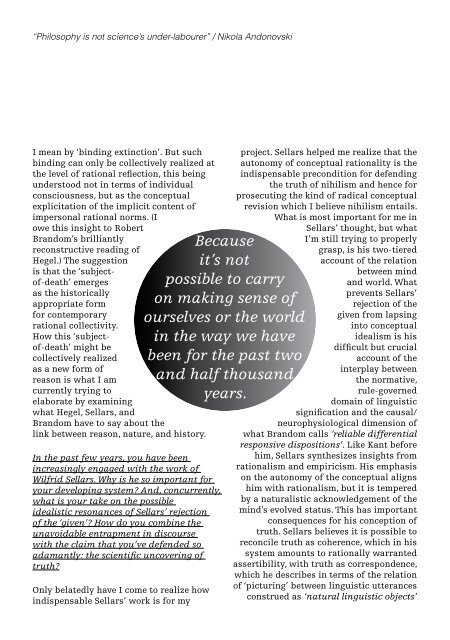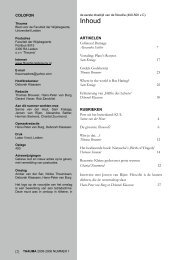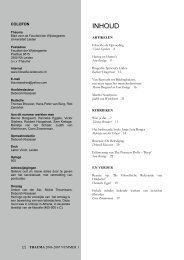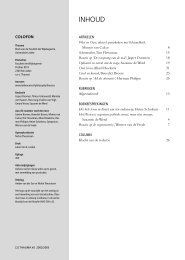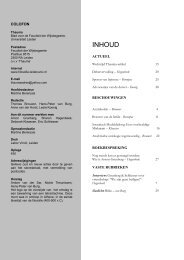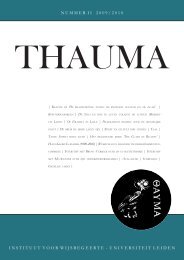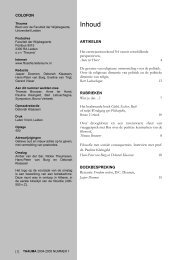Create successful ePaper yourself
Turn your PDF publications into a flip-book with our unique Google optimized e-Paper software.
“Philosophy is not science’s under-labourer” / Nikola Andonovski<br />
I mean by ‘binding extinction’. But such<br />
binding can only be collectively realized at<br />
the level of rational reflection, this being<br />
understood not in terms of individual<br />
consciousness, but as the conceptual<br />
explicitation of the implicit content of<br />
impersonal rational norms. (I<br />
owe this insight to Robert<br />
Brandom’s brilliantly<br />
reconstructive reading of<br />
Hegel.) The suggestion<br />
is that the ‘subjectof-death’<br />
emerges<br />
as the historically<br />
appropriate form<br />
for contemporary<br />
rational collectivity.<br />
How this ‘subjectof-death’<br />
might be<br />
collectively realized<br />
as a new form of<br />
reason is what I am<br />
currently trying to<br />
elaborate by examining<br />
what Hegel, Sellars, and<br />
Brandom have to say about the<br />
link between reason, nature, and history.<br />
In the past few years, you have been<br />
increasingly engaged with the work of<br />
Wilfrid Sellars. Why is he so important for<br />
your developing system? And, concurrently,<br />
what is your take on the possible<br />
idealistic resonances of Sellars’ rejection<br />
of the ‘given’? How do you combine the<br />
unavoidable entrapment in discourse<br />
with the claim that you’ve defended so<br />
adamantly: the scientific uncovering of<br />
truth?<br />
Only belatedly have I come to realize how<br />
indispensable Sellars’ work is for my<br />
Because<br />
it’s not<br />
possible to carry<br />
on making sense of<br />
ourselves or the world<br />
in the way we have<br />
been for the past two<br />
and half thousand<br />
years.<br />
project. Sellars helped me realize that the<br />
autonomy of conceptual rationality is the<br />
indispensable precondition for defending<br />
the truth of nihilism and hence for<br />
prosecuting the kind of radical conceptual<br />
revision which I believe nihilism entails.<br />
What is most important for me in<br />
Sellars’ thought, but what<br />
I’m still trying to properly<br />
grasp, is his two-tiered<br />
account of the relation<br />
between mind<br />
and world. What<br />
prevents Sellars’<br />
rejection of the<br />
given from lapsing<br />
into conceptual<br />
idealism is his<br />
difficult but crucial<br />
account of the<br />
interplay between<br />
the normative,<br />
rule-governed<br />
domain of linguistic<br />
signification and the causal/<br />
neurophysiological dimension of<br />
what Brandom calls ‘reliable differential<br />
responsive dispositions’. Like Kant before<br />
him, Sellars synthesizes insights from<br />
rationalism and empiricism. His emphasis<br />
on the autonomy of the conceptual aligns<br />
him with rationalism, but it is tempered<br />
by a naturalistic acknowledgement of the<br />
mind’s evolved status. This has important<br />
consequences for his conception of<br />
truth. Sellars believes it is possible to<br />
reconcile truth as coherence, which in his<br />
system amounts to rationally warranted<br />
assertibility, with truth as correspondence,<br />
which he describes in terms of the relation<br />
of ‘picturing’ between linguistic utterances<br />
construed as ‘natural linguistic objects’<br />
and the empirical events or objects to<br />
which they are causally connected and<br />
which the signifying counterparts of these<br />
natural linguistic objects are about. Thus,<br />
Sellars maintains, one can dispense with<br />
any invocation of the empirically given<br />
while preserving the representational<br />
link between linguistic assertion and<br />
empirical reality. Obviously I’m caricaturing<br />
what is in fact an exceptionally subtle<br />
and complex theory, but I take Sellars’<br />
crucial proposal to be that it is possible<br />
to abjure all recourse to the given while<br />
acknowledging the mind’s determination<br />
by the physical order. I hope to be able<br />
to do justice to the power and subtlety<br />
of Sellars’ thought in the future, if only<br />
to amend for my woefully inadequate<br />
treatment of him in Nihil Unbound. He is<br />
an extraordinary philosopher and the full<br />
extent of his philosophical achievement has<br />
yet to be realized.<br />
The criticism of speculative realism very<br />
often revolves around a single issue, the<br />
idea that the general antipathy towards<br />
‘correlationism’ entails a concomitant<br />
antipathy towards any form of critique,<br />
a price that many contemporary<br />
philosophers are unwilling to pay. What<br />
is your view on this? Is the project of<br />
‘de-transcendentalization’ in danger of<br />
restoring some sort of speculative naiveté?<br />
I find the expression ‘speculative realism’<br />
increasingly meaningless. What I admire<br />
about Meillassoux’s After Finitude is<br />
the challenge it sets out to continental<br />
philosophers who think Kant resolved the<br />
issue of the relation between philosophy<br />
and the natural sciences and who continue<br />
to invoke Kant as their excuse for ignoring<br />
School / 11<br />
the latter. Thus I wholeheartedly applaud<br />
Meillassoux’s attempt to wake continental<br />
philosophers from their “correlationist<br />
slumber”. But I think it would be a grave<br />
mistake to throw out the baby of Critique<br />
with the correlationist bathwater. In fact,<br />
I think the proper import of the critique<br />
of correlationism has been misunderstood<br />
(perhaps even by Meillassoux himself?). In<br />
my eyes, it is not Kant but rather the neopragmatist<br />
and post-Heideggerian strains<br />
of contemporary anti-Kantianism that<br />
exemplify what is most objectionable about<br />
correlationism.<br />
After Finitude is a philosophical<br />
intervention, not a historical treatise,<br />
and so to complain that its account of<br />
post-Kantian philosophy is somewhat<br />
cavalier would be to completely miss the<br />
point. Nevertheless, it would be fair to say<br />
that the book is not sufficiently attentive<br />
to the question that precipitated Critical<br />
philosophy—namely, “What is the root<br />
of the relation between representation<br />
and reality?” This inattentiveness tends<br />
to vitiate the credibility of Meillassoux’<br />
own speculative solution to the problem of<br />
ancestrality, given that the latter essentially<br />
recapitulates Kant’s original question, viz.,<br />
“How is mathematized natural science able<br />
to tell the truth about reality?” I now believe<br />
that Kant’s ‘weak’ or purely epistemic<br />
correlationism is, ironically enough, far<br />
stronger than its ‘strong correlationist’<br />
successor, which presumes to be able to<br />
dispense with the problem of the ‘in-itself’<br />
altogether. In this regard, Sellars’ critical<br />
reconstruction of Kantianism is exemplary<br />
precisely insofar as it revises Kant’s ‘weak’<br />
empirical realism by according science<br />
access to noumena, while avoiding the<br />
difficulties that dog Meillassoux’s own


